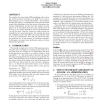Free Online Productivity Tools
i2Speak
i2Symbol
i2OCR
iTex2Img
iWeb2Print
iWeb2Shot
i2Type
iPdf2Split
iPdf2Merge
i2Bopomofo
i2Arabic
i2Style
i2Image
i2PDF
iLatex2Rtf
Sci2ools
112
click to vote
SIGMETRICS
2008
ACM
2008
ACM
Finding the optimal quantum size: Sensitivity analysis of the M/G/1 round-robin queue
We consider the round robin (RR) scheduling policy where the server processes each job in its buffer for at most a fixed quantum, q, in a round-robin fashion. The processor sharing (PS) policy is an idealization of the quantum-based round-robin scheduling in the limit where the quantum size becomes infinitesimal, and has been the subject of many papers. It is well known that the mean response time in an M/G/1/PS queue depends on the job size distribution via only its mean. However, almost no explicit results are available for the round-robin policy. For example, how does the variability of job sizes affect the mean response time in an M/G/1/RR queue? How does one choose the optimal quantum size in the presence of switching overheads? In this paper we present some preliminary answers to these fundamental questions.
Hardware | Mean Response Time | Quantum Size | Quantum-based Round-robin Scheduling | SIGMETRICS 2008 |
| Added | 15 Dec 2010 |
| Updated | 15 Dec 2010 |
| Type | Journal |
| Year | 2008 |
| Where | SIGMETRICS |
| Authors | Varun Gupta |
Comments (0)

